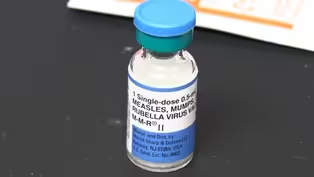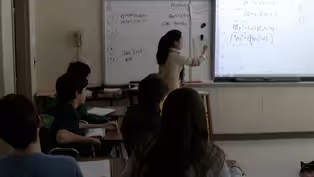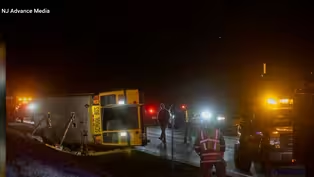NJ Spotlight News
ICE detainees 'lost' in detention system
Clip: 3/11/2025 | 5m 26sVideo has Closed Captions
Interview: Taylor Jung, social justice writer, NJ Spotlight News
Families of detained immigrants say they often can’t find their loved ones after they’ve been taken by U.S. Immigration and Customs Enforcement. They spoke with NJ Spotlight News' social justice reporter Taylor Jung and said the problem is only getting worse.
Problems playing video? | Closed Captioning Feedback
Problems playing video? | Closed Captioning Feedback
NJ Spotlight News is a local public television program presented by THIRTEEN PBS
NJ Spotlight News
ICE detainees 'lost' in detention system
Clip: 3/11/2025 | 5m 26sVideo has Closed Captions
Families of detained immigrants say they often can’t find their loved ones after they’ve been taken by U.S. Immigration and Customs Enforcement. They spoke with NJ Spotlight News' social justice reporter Taylor Jung and said the problem is only getting worse.
Problems playing video? | Closed Captioning Feedback
How to Watch NJ Spotlight News
NJ Spotlight News is available to stream on pbs.org and the free PBS App, available on iPhone, Apple TV, Android TV, Android smartphones, Amazon Fire TV, Amazon Fire Tablet, Roku, Samsung Smart TV, and Vizio.
Providing Support for PBS.org
Learn Moreabout PBS online sponsorshipMeanwhile, a federal judge today blocked the Trump administration from deporting a Columbia University graduate who last spring helped organize the school's pro-Palestinian rallies.
Immigration agents on Saturday arrested Mahmoud Khalil from his university owned apartment over what officials said was his support for Hamas.
According to Khalil's attorney, federal agents told him his student visa was being revoked and detained him, despite being made aware that Khalil is a permanent resident with a green card.
President Trump has said the grad student arrest was the first of many to come vowing to deport international students who protested against Israel and the war in Gaza.
Khalil's detention has put a spotlight on just what happens after ICE steps in.
His wife, who's eight months pregnant, described to reporters the fear she felt when she went to visit Khalil at the Elizabeth Detention Center here in the state, only to find he had been transferred, then transferred again.
Families of detained immigrants say they often can't find their loved ones after they've been taken by ICE and shared with our social justice reporter Taylor Jeong.
The problem is only getting worse.
Taylor joins me now.
Taylor, glad to have you on the show.
Let me start with this.
Of course, the most recent news.
This Columbia University graduate, Mahmoud Khalil, who has gained a lot of attention for the fact that his family could not locate him.
But through your reporting, you have found that this is not uncommon.
What have families told you?
Right.
So in close case, his pregnant wife went to go visit him.
Elizabeth Detention Center on Sunday and found out that he wasn't there.
And like you just mentioned, that's the kind of the case for a lot of different families.
They'll show up at the detention center only to find out that their loved one has been transferred.
Now, there is an online tracking system that ICE has.
So you can see where a detainee is are.
But what's happening now with the influx of ICE arrests is that that tracking system is not updated in a regular or consistent fashion.
So before this year, maybe it took about a day for it to update when now lawyers are saying it could take 2 to 3 days or even longer to kind of show where the person is.
So if a family member, like in the case of Khalil, shows up and their loved one, the detainee is not there, what do they do?
What action do they have if the tracking system hasn't caught up?
Well, in most cases they're turned away and it's a frustrating experience for families, but also lawyers.
Now, lawyers can call that a deportation officer and kind of ask what's going on with their detainee's case.
But once they get transferred, there's a new deportation officer assigned and the old one doesn't get any updates.
So what I've heard from individuals is that usually you just have to wait until your loved one appears, either in the system or arrives at the facility, is processed, and then can finally make a phone call to you and let you know where you are.
But if they're being transferred, as it seems like is the case, because a lot of these detention facilities are filling up more quickly than they had given this ramp up.
How are the families then able to track them down if they're being bounced between different locations?
Well, in between when between transfers with other facilities, families are actually in the dark because detainees don't have access to a phone or anything like that.
So really, it is just waiting and it seems like an almost unbelievable answer.
I kind of pushed a lot of my sources further, whether it be family members, lawyers, advocates, like really, you just have to wait until the person appears and they pretty much just said, yes, you're waiting for that phone call from your loved one to say, hey, this is where I am.
And lots of times detainees themselves are figuring it out in real time with the help of other people that are also detained, that have kind of been through the process before.
I know you spoke with one family in particular.
What did they share with you about their experience?
Just trying to navigate this while being, you know, as you said, in the dark.
They have just been trying to keep track of their loved one.
He was first this was their brother in law that was detained.
He was first at Elizabeth Detention Center, then got moved to a facility in Pennsylvania, then Louisiana, then back to Pennsylvania when he was first in Pennsylvania.
They did try to visit him.
And similar to what we discussed earlier, they found out that he wasn't there and they just said that in those transfer periods, they're in the dark and it's getting to the point where their loved one is also experiencing a lot of emotional distress in the process because either conditions are worsening or he's also frustrated himself about what's happening.
Taylor Junge The full reporting is online and Spotlight News Talk.
Taylor, thanks so much.
Thank you.
Doctors in NJ on alert for measles
Video has Closed Captions
Clip: 3/11/2025 | 4m 53s | Advice about symptoms and what to do in case of infection (4m 53s)
Judge blocks Trump defunding of teacher training program
Video has Closed Captions
Clip: 3/11/2025 | 1m 6s | New Jersey AG Matt Platkin co-led a lawsuit challenging the termination of funding (1m 6s)
NJ students injured in Parkway bus crash
Video has Closed Captions
Clip: 3/11/2025 | 1m 6s | A 14-year-old traveling from Lakewood remains in critical condition (1m 6s)
RU revives goldmine of pregnancy data hidden in freezers
Video has Closed Captions
Clip: 3/11/2025 | 5m 20s | Researchers collected specimens from Camden women for decades (5m 20s)
Providing Support for PBS.org
Learn Moreabout PBS online sponsorship
- News and Public Affairs

Top journalists deliver compelling original analysis of the hour's headlines.

- News and Public Affairs

FRONTLINE is investigative journalism that questions, explains and changes our world.












Support for PBS provided by:
NJ Spotlight News is a local public television program presented by THIRTEEN PBS



